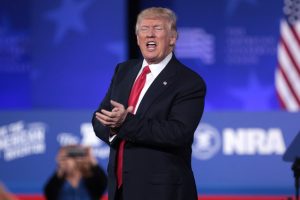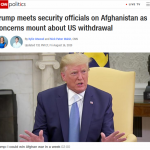by Ben Armbruster
The Iraq war, endless conflict, and a ridiculously out-of-control Pentagon budget: They’re all products of the bipartisan, cross-ideological consensus in Washington—i.e. “the Blob”—that promotes military primacy as the key tenet of U.S. foreign policy.
It might seem odd then to assert that National Public Radio—where progressives from San Francisco to Austin to Burlington turn to for the day’s news—is a member of the club, as the public broadcaster isn’t necessarily known for promoting this militaristic orthodoxy.
But that’s not entirely accurate.
Last Sunday’s broadcast of Weekend Edition is a case in point. In a segment purporting to provide “right and left” perspectives on the week’s foreign policy news, NPR instead hosted two prominent figures from DC’s foreign policy establishment whose views weren’t too far off from one another: Danielle Pletka of the American Enterprise Institute and Brian Katulis of the Center for American Progress.*
Frustratingly, there really wasn’t much of a foreign policy debate during the Weekend Edition segment. Regarding the row over Israel barring Reps. Rashida Tlaib and Ilhan Omar from entering Israel and Palestine, Pletka lamented that the episode did the congresswomen “a huge favor,” and she blasted them for their alleged “odious views,” which she did not specify.
Katulis’s response from the “left” was to say nothing positive about Tlaib or Omar, nor to defend them against Pletka’s attacks. A more progressive response could have perhaps highlighted how racist and authoritarian politics, practiced by Donald Trump and Israeli Prime Minister Benjamin Netanyahu, fueled this particular incident against two Muslim women of color who also happen to be U.S. Members of Congress.
On the topic of the Hong Kong protests, Katulis correctly noted Trump’s failure to criticize Chinese President Xi Jinping’s heavy handed response, but at the same time let Trump mostly off the hook by saying it represents how the president is merely “passively appeasing” despots around the world. Missing from this analysis, for example, is that Trump actively defended the Saudis after the murder of Jamal Khashoggi, an American resident who worked for the Washington Post. Indeed, Trump’s appeasement of authoritarians is anything but passive.
While Katulis did rightfully offer regret that Trump “give[s] more incentive for countries like China to do what they want to do,” both he and Pletka agreed that Trump is being “weak” and not “forceful” enough towards China in the wake of the Hong Kong protests, a refrain that’s reminiscent of the “let’s get tough on China” rhetoric we see from hawks on both sides of the aisle. “This is something, as Brian said, that was a problem under Obama, and it’s still a problem under Trump,” Pletka added.
It’s all fairly standard so-called “expert” bipartisan consensus analysis from the Blob. And not that there’s anything wrong with debate, but Katulis and Pletka have had years of practice perfecting their non-confrontational craft as they have both regularly appeared on policy panels together (and even co-authored an op-ed).
But beyond NPR’s elevation of establishment foreign policy thinking, the worst part about this segment is that NPR is presenting Katulis and Pletka as if their credentials are benign and uncorrupted. For example, Pletka—who was last seen denying climate change science on national TV—is the beneficiary of the no-accountability standard in Washington, as she is still gainfully employed (and uplifted by NPR, of course) despite her history of moral and analytical failure in supporting torture, the Iraq war, and calling for war with Iran. Meanwhile, the Intercept reported earlier this year that CAP’s watered down response to Khashoggi’s murder may have been linked to Katulis’s close relationship with the United Arab Emirates’ ambassador to the U.S. (the UAE is a close ally of Saudi Arabia), Yousef Al Otaiba, and the fact that the UAE had donated hundreds of thousands of dollars to CAP. (CAP has since said it will no longer accept funds from the UAE and, according to the Guardian, CAP “said it is parting ways with what it views to be anti-democratic governments across the globe.”)
What’s more is the Weekend Edition segment’s transgression on Sunday wasn’t an isolated incident. NPR has been known to give air-time to anti-Iran deal propaganda and provide a platform for pro-war and regime change voices like Foundation for the Defense of Democracies CEO Mark Dubowitz without context or challenge.
It’s important that we have real debates from truly opposing perspectives about the direction of U.S. foreign policy, instead of the narrowly confined discussions typical in Washington that only explore how, not whether, U.S. power should be deployed in certain circumstances. It’s not hard to find both progressive and conservative experts and analysts who don’t adhere to the pro-militaristic Washington foreign policy consensus and who have opinions on these topics. It’s a shame that NPR, during a time when we need reliable and trusted media sources the most, doesn’t appear interested in elevating voices outside of that bubble.
*Full disclosure: the author worked at CAP while Katulis was also employed there.






I fail to see how Armbruster moves the discussion toward better understanding, and an approximation to policies to resolve problems, and reduce hostilities. Both sides seem to be stuck in habitual thinking, and Armbruster is not helpful. At least the U.S. presently is “breaking eggs, to make an omelet.” Change will happen, hopefully for the good of resident people. Growth, employment, and trade, suggest a potential of shared benefits. Ultimately tolerance of differences, and societal integration can/will make “a pursuit of happiness” practical.
. . .from the NPR Ethics Handbook: “NPR is at its core a news organization.”
And what is “news?” It’s “newly received or noteworthy information” which for NPR, as with other MSM sources, is entertainment and reinforcement of the establishment, including the corporations which provide 29% of NPR’s funding and government 16%.
This is a situation that couldn’t withstand real debates from truly opposing perspectives. That is time-consuming and thinking-required and not the entertaining “news” that will reinforce patriotism, contributions and donations. That would just upset people who respond best (apparently) to “breaking news.”
U.S. is compelled to war precisely because its purpose is ‘to win’… In History, all the big winners have been so through war, conquest wars needless to say. A world built nowadays basically multi centred with multiple alliances, intense commercial exchanges, is naturally against war. The problem however is that U.S. still wants to keep the dominant role it inherited after WWII when the entire world (U.S. unscathed) has been flattened, morphed into a pile of rubble. Now, to exert domination powers in a complex world needs superior knowledge, superior purposes, extremely high moral compass, and U.S. lacks all of these. U.S. in its rather primitive ‘superiority’ which is well represented by such Presidents as the Bush and Trump, war is still the way to go. In that respect other powers see U.S. really as a potential threat, not necessarily Europe but Russia and China; so those powers tend to arm themselves and flex some muscles. For the U.S. this represents exactly the ‘threat’ it needs to justify its own warmongering stance. An endless vicious circle…
“It’s important that we have real debates from truly opposing perspectives about the direction of U.S. foreign policy.”
Why is it important for citizens to have any opinions on foreign policy? They can’t do anything about it, and NPR like the rest of MSM knows that. The public has absolutely no input into foreign policy, in fact many people who should know better claim that foreign policy is solely the president’s business.
Americans every so often get to vote for a senator who will be bought and paid for when he’s in office, and also get to vote for one schmuck or another (of two) for president every four years, who will then do whatever he wants to do.
Are you suggesting that this is a democracy??
As for winning wars, Dan Rather, an iconic US journalist: “Look I’m an American. I never tried to kid anybody that I’m some internationalist or something. And when my country is at war, I want my country to win, whatever the definition of ‘win’ might be. Now, I can’t and don’t argue that that is coverage without prejudice. About that I am prejudiced.”
I don’t disagree with Jose’s and Don’s comments above but I want to raise a question. Could it be possible that the decline of USA power is a bit overstated? US has two main ways of exercising its dominance over the world: supremacy of dollar and its military power. I think both are actually stronger in a globalized economy. Look at predicamet of Iran [or even China now that Trump wants US companies to leave China]. The dominant multinationals are American, international finance is controlled by Americans, US military is more powerful than ever. We live in a unipolar world. The attempt by Russians and Chinese to create a multipolar is a “chatter”. Europeans are more suppliant than ever to US power. So, yes I think that there are holes in the decline theory. I don’t buy it.